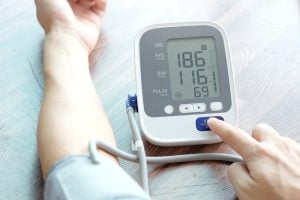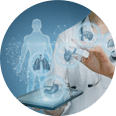Hypertension is commonly referred to as the silent killer because there are little to no warning signs, but it’s a big contributor to cardiovascular disease. As heart disease is one of the leading causes of death in both men and women, we want to answer some of your biggest questions about cardiovascular disease and the silent killer, high blood pressure.
What is hypertension and why is it called the silent killer?
 As previously mentioned, hypertension is often called the silent killer because there are no obvious symptoms, and it can go undetected for a long time. But when left untreated, it leads to a significantly greater risk of heart attack, stroke, and other heart-related conditions. Blood pressure refers to the force of blood flowing through the blood vessels, and hypertension is the result of consistently high levels. It’s important to know your numbers and get regular doctor’s checks, especially if you have a family history of high blood pressure and heart disease. Elevated blood pressure levels begin at anything over 120 over 80, and the first stage of hypertension falls between a systolic number of 130 – 139 and a diastolic number of 80 – 89.
As previously mentioned, hypertension is often called the silent killer because there are no obvious symptoms, and it can go undetected for a long time. But when left untreated, it leads to a significantly greater risk of heart attack, stroke, and other heart-related conditions. Blood pressure refers to the force of blood flowing through the blood vessels, and hypertension is the result of consistently high levels. It’s important to know your numbers and get regular doctor’s checks, especially if you have a family history of high blood pressure and heart disease. Elevated blood pressure levels begin at anything over 120 over 80, and the first stage of hypertension falls between a systolic number of 130 – 139 and a diastolic number of 80 – 89.
What are some other common causes of heart disease?
Here are a few more common causes of cardiovascular disease besides high blood pressure:
Family history and age: As you age, you naturally have a greater risk of weakening heart muscle and damaged arteries, but that risk is even higher if you have a family history of heart disease, especially if a parent or family member experienced it at an early age.
Diabetes and obesity: A poor diet high in sugar, fat, and sodium greatly increases your risk for heart problems, even more aggravated by excess weight and diabetes.
High cholesterol: Something that often goes hand in hand with hypertension is high cholesterol levels. This results in plaque formation, another contributing factor in cardiovascular disease.
Stress and inactivity: High stress levels and sedentary living can damage your body and put you at a greater risk of heart problems.
Overuse of alcohol and tobacco products: Smoking and vaping are some of the worst things you can do for your body and increase your chances of not just cardiovascular issues but also cancers and stroke.
What are the early signs and symptoms of cardiovascular disease?
 Chest pain and discomfort is probably the first thing you think of when it comes to heart disease, but there are several more warning signs to look out for. Symptoms such as fatigue, shortness of breath, lightheadedness, heavy sweating, extreme anxiety, coughing, and wheezing could all be cause for concern. Also, swelling in the legs, ankles, or feet, as well as numbness in the feet due to poor blood circulation, can be indicators of heart issues and blood vessel blockages.
Chest pain and discomfort is probably the first thing you think of when it comes to heart disease, but there are several more warning signs to look out for. Symptoms such as fatigue, shortness of breath, lightheadedness, heavy sweating, extreme anxiety, coughing, and wheezing could all be cause for concern. Also, swelling in the legs, ankles, or feet, as well as numbness in the feet due to poor blood circulation, can be indicators of heart issues and blood vessel blockages.
Are symptoms of heart disease different for women than men?
A very important question about cardiovascular disease is whether or not men and women experience different symptoms. Yes, women can absolutely experience completely different symptoms of heart disease than men! Unique symptoms women often report include extreme fatigue, shortness of breath, indigestion, nausea, dizziness, fainting, and pain in the jaw or upper back. Women also face additional risk factors from preexisting conditions such as PCOS, endometriosis, autoimmune diseases, and menopause.
What are the best preventative measures for cardiovascular disease?
 Lifestyle changes are one of the best ways to reduce your risk of heart disease. Take a look at these top recommended preventive measures:
Lifestyle changes are one of the best ways to reduce your risk of heart disease. Take a look at these top recommended preventive measures:
- Quit smoking and avoid all tobacco products (yes, that includes vaping).
- Consult regularly with a doctor to monitor diabetes, blood pressure, and cholesterol levels.
- Get testing done such as a coronary calcium scan and/or a carotid IMT scan.
- Eat a heart-healthy diet low in saturated fats and sodium.
- Exercise consistently– walking for 30 minutes a day is a great starting point.
- Ask about cardiovascular supplements.
- Reduce stress levels by practicing mindfulness, meditation, or yoga.
How can Elite Personalized Medicine help you?
Our functional medicine center focuses on treating you as a whole person, not just your symptoms. We use diagnostic testing, in-depth consultations, and high-quality supplementation to form a personalized, effective treatment plan. We also offer health coaching and weight loss programs so you can take control of your own health and begin a long-lasting wellness journey with results you can be proud of.
We hope we’ve answered some of your questions about cardiovascular disease and given you some helpful information about how functional medicine can get you back on track. Please reach out to us and request a consult. Our team is ready to help you however we can!











